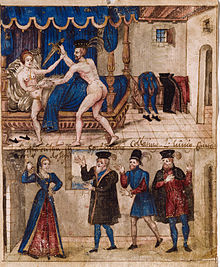Lucretia (Shakespeare)
Lucretia ( The Rape of Lucrece - The disgraced Lucretia ) is an epic Poetry of William Shakespeare , published in 1594th
action
Shakespeare's poem tells a very old one, e.g. For example , the story passed down by Titus Livius and Ovid , the tragic story of the Roman Lucretia , wife of Collatinus from the royal family of the Tarquinians , famous for her beauty and virtue. The subject itself has been dealt with many times, in poetry, dramas and pictures. During the war the women of Rome are alone in the city and use the absence of their husbands to lead an immoral way of life. Except for Lucretia, who doesn't cheat on her beloved husband, Collatinus. This sparks the men’s ambition, and one night Prince Tarquinius secretly returns to the city after a failed attempt at seduction to rape Lucretia. During the night he goes to her room and threatens her, but she says she would rather die than be unfaithful to her husband. She says: "Think but how vile a spectacle it were / To view thy present trespass in another. / Men´s faults do seldom to themselves appear" (631ff). However, when Tarquinius claims that he would lay her corpse next to that of a dead slave and then accuse her of fornication (which is why he killed them both in the act), she endures the act. After the rape, Tarquinius disappears and Lucretia has her husband and father called. She tells both of what happened and is found innocent by them. Nevertheless, Lucretia kills herself so that no unfaithful woman can plead her fate in the future and thus get away with impunity.
Audio book
- Venus and Adonis . Tarquin and Lucretia. Two poems. Voice of Jutta Lampe . Bibliotheca Anna Amalia , 3. Der Audio Verlag , 2007 ISBN 9783898136358 (in German). With booklet
Web links
- The Rape of Lucrece (Wikisource)
- The Rape of Lucrece (Project Gutenberg)
- The Rape of Lucrece on Open Source Shakespeare
supporting documents
- ↑ ISBN is valid several times as it is assigned to a cassette with 9 titles
